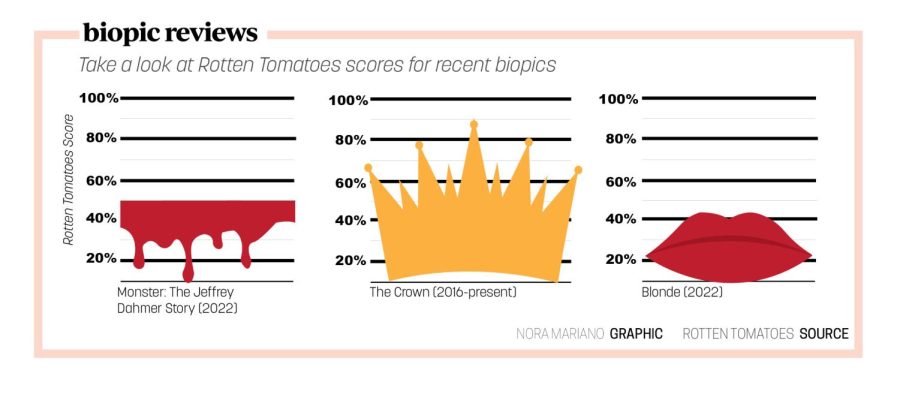Biopics created without the subject’s consent can damage their well-being and public image.
Everywhere you look it seems new biopics–biographical movies about celebrities’ lives– are being created and streamed. Popular biopics like “The Crown,” “Blonde,” and “Monster: The Jeffrey Dahmer Story” (all released in the past year, with The Crown’s fifth season releasing next month) have earned mixed reviews. With the rise in new biopics of celebrities’ and convicts’ lives, the morality of these movies is unclear.

When writers and directors commit to making a biopic, many reach out to their subjects to ask for consent, but they don’t actually need their approval. Asking for a source’s blessing becomes more of a gesture than anything else. Certainly, people who don’t give permission can later sue movie-creators for defamation of character, but lawsuits are expensive and often take a lot of time to see through.
For example, “The Crown” never got approval from the British royal family. The former Queen’s communications secretary, Donal McCabe, said in a letter written to the London Times, “The Royal Household has never agreed to vet or approve content, has not asked to know what topics will be included, and would never express a view as to the programme’s accuracy.”
So while it’s unrealistic to expect complete accuracy, creative license of this type of media can change public opinion on the person. One of the complaints against “Monster: The Jeffrey Dahmer Story” is that people thought it sympathized with and explained away Dahmer’s actions. Many people have criticized director Andrew Dominik for his movie “Blonde” about Marilyn Monroe because they said it focused on Monroe’s mental health struggles and ignored her achievements and activism.
With these criticisms in mind, then, watching these movies can impact people’s opinions on their subjects. In “Blonde,” for example, there is a scene that confirms Monroe and then president John F. Kennedy had an affair. But this was never proven in real life and only fuels a negative rumor. Biopics do indeed have influence over how we remember people, especially for younger audiences who were not aware of the event beforehand. This is extremely unfair if the subject isn’t alive anymore to speak out against the biopic.
Finally, the replication of disturbing events for biopics can kick up past trauma for the people who survived it. The Gucci family has criticized the movie “House of Gucci” in part because the movie brought back their grief around Maurizio Gucci’s murder. The same is true with “Monster: The Jeffrey Dahmer Story.” Relatives and friends of Jeffrey Dahmer’s victims re-lived the horrific things that happened by watching that show.
Without permission from their subjects, it is immoral to create biopics. No matter how engaging the story is, from serial killers to the royal family, the negatives of poorly made biopics outweigh the profitability.

































![AI in films like "The Brutalist" is convenient, but shouldn’t take priority [opinion]](https://hilite.org/wp-content/uploads/2025/02/catherine-cover-1200x471.jpg)










































![Review: “The Immortal Soul Salvage Yard:” A criminally underrated poetry collection [MUSE]](https://hilite.org/wp-content/uploads/2025/03/71cju6TvqmL._AC_UF10001000_QL80_.jpg)
![Review: "Dog Man" is Unapologetically Chaotic [MUSE]](https://hilite.org/wp-content/uploads/2025/03/dogman-1200x700.jpg)
![Review: "Ne Zha 2": The WeChat family reunion I didn’t know I needed [MUSE]](https://hilite.org/wp-content/uploads/2025/03/unnamed-4.png)
![Review in Print: Maripaz Villar brings a delightfully unique style to the world of WEBTOON [MUSE]](https://hilite.org/wp-content/uploads/2023/12/maripazcover-1200x960.jpg)
![Review: “The Sword of Kaigen” is a masterpiece [MUSE]](https://hilite.org/wp-content/uploads/2023/11/Screenshot-2023-11-26-201051.png)
![Review: Gateron Oil Kings, great linear switches, okay price [MUSE]](https://hilite.org/wp-content/uploads/2023/11/Screenshot-2023-11-26-200553.png)
![Review: “A Haunting in Venice” is a significant improvement from other Agatha Christie adaptations [MUSE]](https://hilite.org/wp-content/uploads/2023/11/e7ee2938a6d422669771bce6d8088521.jpg)
![Review: A Thanksgiving story from elementary school, still just as interesting [MUSE]](https://hilite.org/wp-content/uploads/2023/11/Screenshot-2023-11-26-195514-987x1200.png)
![Review: "When I Fly Towards You", cute, uplifting youth drama [MUSE]](https://hilite.org/wp-content/uploads/2023/09/When-I-Fly-Towards-You-Chinese-drama.png)
![Postcards from Muse: Hawaii Travel Diary [MUSE]](https://hilite.org/wp-content/uploads/2023/09/My-project-1-1200x1200.jpg)
![Review: "Ladybug & Cat Noir: The Movie," departure from original show [MUSE]](https://hilite.org/wp-content/uploads/2023/09/Ladybug__Cat_Noir_-_The_Movie_poster.jpg)
![Review in Print: "Hidden Love" is the cute, uplifting drama everyone needs [MUSE]](https://hilite.org/wp-content/uploads/2023/09/hiddenlovecover-e1693597208225-1030x1200.png)
![Review in Print: "Heartstopper" is the heartwarming queer romance we all need [MUSE]](https://hilite.org/wp-content/uploads/2023/08/museheartstoppercover-1200x654.png)



